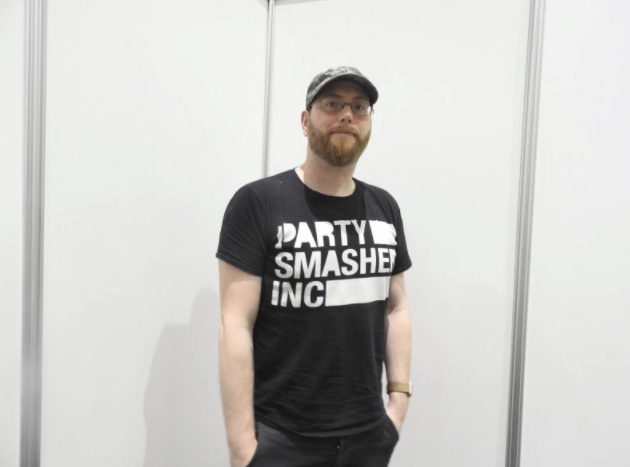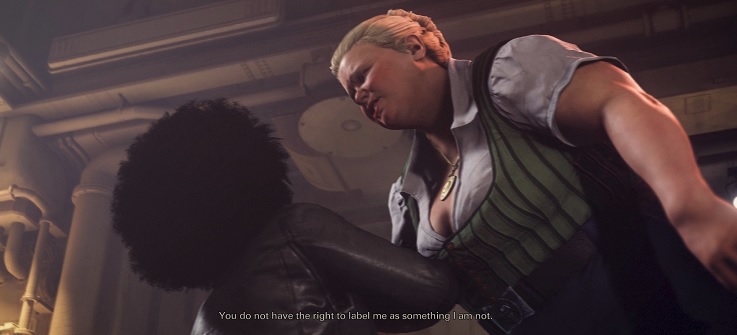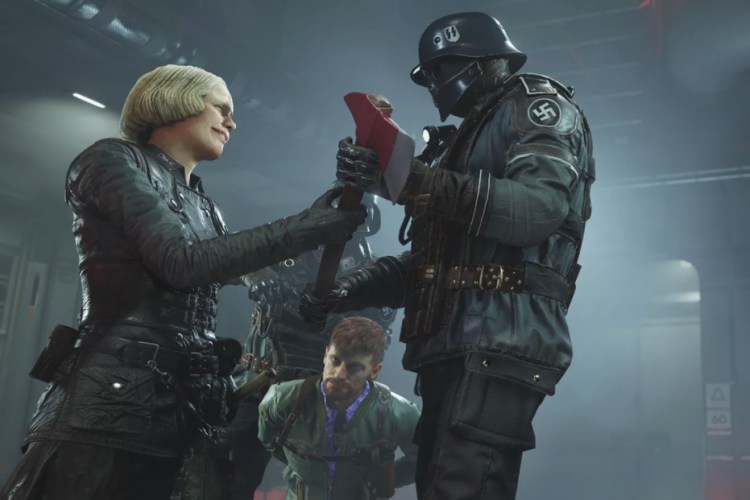Wolfenstein II: The New Colossus was one of the great games of the fall season when it debuted last October. Most people have forgotten about it, but one of my favorite things to do is to talk with a creative director about a game after I’ve finished it and after most players don’t worry about spoilers anymore. I took advantage of this kind of opportunity last week at the Game Developers Conference, when I had a chance to interview Jens Matthies, creative director of Wolfenstein II: The New Colossus.
Matthies is a Swedish born game developer who teamed up with fellow Swede Tommy Tordsson to take a satirical and distant look at American society and what it would be like if the Nazis won World War II and instilled their culture in the U.S. You would think that Swedes writing about American society under a hypothetical German victory is a recipe for disaster. But they pulled off a brilliant story and an outstanding game, and they showed how complex telling stories about Nazis can be.
Editor’s note: If you haven’t played this game and still want to, be aware this interview has spoilers.
Wolfenstein II is one of the best first-person shooters, and it also had many creative elements that made it a favorite at GamesBeat. I talked with Matthies about it, and the postmortem made me feel like I was talking with the creator of a great work of art, as if I had gotten a chance to interview Van Gogh about The Starry Night. We talked about the ending, the impact of the game, and the discussion that it stirred among gamers.
Matthies was kind enough to confirm that Frau Engel, with her head split open at the end of The New Colossus, isn’t coming back.
He said, “Oh, yeah. She’s done for. That ship has sailed. Not in a physical form at least. Who knows? Maybe there’s a flashback. Not confirming Wolfenstein III, by the way! I’m just speculating here. In theory, if that game were to happen, there would be a different villain.”
Here’s an edited transcript of our interview.

Above: Jens Matthies is creative director of Wolfenstein II: The New Colossus.
GamesBeat: What’s it been like being an expert on American culture?
Jens Matthies: Well, I think I’ve been that for a long time. It’s weird. You can never—I pay a lot of attention to the U.S. and always have. I think it’s because I’m such a huge consumer of American culture. But of course some things are always strange when you start spending significant amounts of time here. Not objectively strange, but strange from my perspective. Things you discover over time as you spend a lot of time in the U.S. and interact with Americans. Even so, it’s not like we know everything. Sometimes you have to consult with people to figure some stuff out.
GamesBeat: It looked like you spent some time in Texas.
Matthies: A bit, yeah. But more than that, we have — there are a number of Bethesda studios in Texas, especially id Software. To make the Texas segments as authentic as possible in terms of dialogue and characterizations, we consulted with Kevin Cloud at id, who’s very attuned to how things used to work. He consulted on the script and that led to some changes. The actor we cast for Rick, B.J.’s father, Glenn Morshower, grew up just outside Dallas and was very — he was around when people from this era were around. He was also operating as a consultant on the characters.
GamesBeat: You had lots of ways to stay authentic, but still look at a culture from the outside.
Matthies: Yeah, yeah. But it depends, too, on — I think there are a lot of human universals. It’s hard to say, of course. It’s not as if I have a high degree of familiarity with every culture on the planet. But at least there are many universals between northern Europe and the U.S. I think if you go for those universals, which we tend to do when we think about our characters, it doesn’t become that big of a gap to bridge. But we’re constantly talking to people and looking for ways to improve and make it feel more authentic.

Above: Combat is always a frenzy in Wolfenstein II.
GamesBeat: I found a pretty good intersection between the themes in your story and the reality of the United States at the same time. It’s a rare case of on-target social commentary.
Matthies: Yeah, well — in terms of what the game is doing, that was never part of the plan. We just wrote the best story we could and thought about how to implement it the best way we could. But I think the fact that it provides some commentary says more about how the story has some important themes that it’s dealing with.
GamesBeat: Ubisoft’s story in Far Cry 5 is in some ways not so different. They’re looking at the U.S. from the outside, and found some similarly disturbing undercurrents.
Matthies: I don’t think that’s particular to the U.S. There are disturbing subcultures in any society. I look forward to Far Cry 5, to playing it, but I’ve been trying to stay pretty spoiler-free. I don’t know too much about it.
GamesBeat: How do you look at your game in retrospect?
Matthies: I’m extremely happy about the reception it’s received, which I think is especially rewarding for me, because it’s going to some pretty extreme places. It’s very gratifying as a creator to have such universal acclaim for the game, because it’s quite controversial in many ways, and that can be polarizing. I’m happy that people get what the game is doing.
In terms of production it was the first time we shipped a game on schedule. First time in 20 years that’s happened with a full-price game. The Old Blood we also shipped on schedule, but it wasn’t quite on the same level of ambition. That is also extremely rewarding, when you have a sense that you’ve maybe finally cracked that puzzle.
GamesBeat: Nothing went badly wrong and caused a lot of delays?
Matthies: Well, a ton of things went catastrophically wrong as it always does in development, but we were able to somehow figure out a way out of that, which is a huge testament to some incredibly talented people on the team. It’s not that we didn’t encounter adversity. We were just able to negotiate our way out of it for some reason, this time around.
GamesBeat: Were there particular reactions to any pieces of the game that were interesting to you? I thought it was funny that you were able to pull off the part about the head getting chopped off.
Matthies: [laughs] Perhaps that whole sequence, from encountering your father as an adult through to the beheading and getting a new body — that entire symphony of things that happened was incredibly challenging to execute in a way that felt good. But those are the kind of challenges we like. To me that’s an incredibly intriguing problem. When I think about it, I want to solve it. So I’m very happy.

Above: The Freedom Chronicles Season Pass gives you more Wolfenstein II content.
GamesBeat: It’s very risky storytelling.
Matthies: But that’s what makes it fun. You want to be there on the edge and trying new stuff that people haven’t done. Then you can only do the best you can and cross your fingers that it will work. Most people seemed to get it.
GamesBeat: Is there anything else you look back on like that?
Matthies: I think the whole game is just a series of tricky things to execute right. Starting with the wheelchair sequence, or even before that, the prologue with all these flashbacks back and forth and different points in time, different locations, B.J.’s childhood. Hiding in the closet with the dog as the parents are arguing. All of these have to come together in a particular way to work — not just in terms of the writing and performance, but everything. The audio design. How are the blinds in the wardrobe door located, so you have visibility, but you’re still hiding in there? There are tons of things to work through and iterate on until it feels like a cohesive piece.
https://www.youtube.com/watch?v=inHvZ25b5VY
GamesBeat: I felt like I had too much freedom to get lost and wander in the submarine.
Matthies: It is pretty big. In some ways it’s challenging because it needs to fill a lot of purposes, the submarine. Did you use the hint markers? You can call up secondary hints by pressing down on the D-pad. That’s also a problem in terms of tutorializing, because you want to keep the energy up when things are happening, but you’re tutorializing at the same time. It may be that players get distracted by something else as the tutorial is being presented.
GamesBeat: As far as the Hitler scene, that got a lot of attention. Did you anticipate that? Was anything surprising about the reaction?
Matthies: It’s hard for me to quantify, because I don’t really track that stuff. You read 100 comments, and even if 95 are positive, the other five really depress you. I don’t look at reactions too much. But I was incredibly happy with how the scene came out. That was challenging to put together in all its faces. It came out better than I envisioned, and when that happens it’s always amazing. To a very large degree it’s thanks to the amazing performers. They really got in there and found ways to make the material better than I thought was possible.
GamesBeat: Why did you want to go into space again?
Matthies: We even teased it in the first game. We always wanted to make a level on Venus, but–
GamesBeat: Because of the gameplay variation?
Matthies: Yeah, yeah. It’s everything, really. I love that sense of adventure. That’s part of what we want to do, to have some of that Indiana Jones, going to cool places. What’s cooler than going to a different planet? Venus was interesting because it hasn’t been done so much. Destiny has, but I don’t think anybody else has. It’s pretty rare, anyway. Usually it’s Mars. Dealing with Venus and the different look and the atmospheric problem and all that stuff, we thought that would be really cool.
In the first game, when you go to London Nautica, you see posters that say “Next Stop Venus!” Of course it’s in German, but—all of that stuff is seeded in the first game. We really wanted to pay that off in this one.
GamesBeat: I had a little trouble with those crypto puzzles at the very end.
Matthies: Oh, yeah, the Enigma stuff. I wasn’t too heavily involved in that thing, because it’s very pure gameplay mechanics, but there was a lot of iteration around figuring that out.
GamesBeat: Did you find a lot of people went off and did those?
Matthies: For sure, tons of people. From the data, it’s very common. As a developer it’s always hard to know if things are a little too complicated for people to understand, because you evolve with the problem as someone tells you how to work it.
GamesBeat: Going off and finding extra things to do after the story over, though, that was fun.
Matthies: Yeah, yeah, having some sort of endgame there so people could get more out of the game.
GamesBeat: Do you have any reactions to the ending? We can talk about spoilers now that everyone’s finished it, I suppose.
Matthies: I think it has the right vibe of creating a sense of revolution and capping it off with a proposal. I feel good about it. It’s also very different depending on the timeline. It’s two different speeches. I don’t know which timeline you played.
GamesBeat: There’s a finality to the ending for the villain. Splitting her head in two, you can’t bring her brain back.
Matthies: Oh, yeah. She’s done for. That ship has sailed.

Above: Wolfenstein II: The New Colossus
GamesBeat: Not coming back in Wolfenstein III?
Matthies: Not in a physical form at least. Who knows? Maybe there’s a flashback. Not confirming Wolfenstein III, by the way! I’m just speculating here. In theory, if that game were to happen, there would be a different villain.
GamesBeat: Jeff Grubb liked the game a lot, too. He kept arguing with me about how it was better than Call of Duty.
Matthies: [laughs] Well, thank him from me. I don’t think there’s really anything alike in the games we’re making. They’re first-person shooters, fundamentally, but in terms of the vibe and the twists and turns of the story beats — basically, I don’t think any other publisher would greenlight these projects.
GamesBeat: One of his points that I agree with, he felt like you held it together in a storytelling way very well. Starting with a subplot and having it go through an arc and finishing it. Not every game accomplishes that.
Matthies: We work a lot on that. We always map out the arcs for each character. Tommy and I, my co-writer, we’ll talk everything through. We’ll sketch something out. If we’re not happy about it we discuss something again and we’ll figure out something else. There’s a lot of thought put into — we want each of our characters to feel like they’re going on some sort of journey along with you. We don’t like it when they’re static the whole way through. But that’s challenging, too, when you have such a big cast. It’s hard to fit everything in. I’m happy with how it came together.
GamesBeat: Did you have any interesting reactions to the daughter character, Sigrun Engel? She could be viewed in a lot of different ways, I think, whether she was sympathetic or laughable or something else.
Matthies: Alyssa Preston, who played the character, did an amazing job in conveying that complexity. Of course this is someone who grew up as the daughter of a big Nazi party leader. Completely absorbed in the Nazi ideology and culture. She’s trying to find her way out of that, but she still has tremendous crimes in her history. Even though she perhaps wasn’t the main engineer of those crimes, she wasn’t very active in trying to stop them either. She’s a complicated character. Alyssa did an amazing job of humanizing her. She’s always interesting, at every moment you have with her. I don’t mind it if you as a player have conflicting emotions about our characters.

Above: Sigrun Engel plays a significant role in Wolfenstein II: The New Colossus.
GamesBeat: In some ways it seems tricky because she’s a sympathetic character, but you don’t want to make her too sympathetic, because that becomes a political statement. “Hey, not all of these Nazis are so bad.”
Matthies: I think it’s also important — of course, this happened back then, and it happens today — to show the people who get out of that world. There’s something hopeful about that. This is an interesting part of the game, how we leave a lot of information about the characters up to the player. You as a player decide your own level of involvement.
There’s a big scene you can discover, if you go to the canteen in the submarine at the right time — there’s an argument between Anya and Sigrun about Sigrun being passive while these atrocities have occurred. But not every player gets exposed to that. There’s a lot of additional depth you can find, depending on how willing you are to spend time exploring. That’s the nature of our games. We want players to have that freedom. Some people like to push through and do a lot of shooting. Some people like to look at every note and explore every room. We like to permit that whole range.
GamesBeat: In this case you lose out more if you don’t pay attention to what seems to be a minor character.
Matthies: I guess I’m that kind of person myself. I like to do a lot of exploring. I love that in games, when I enter a space and see something new there, something happening. It didn’t have to be there. The game would still work. But to find stuff like that is very rewarding as a player.

